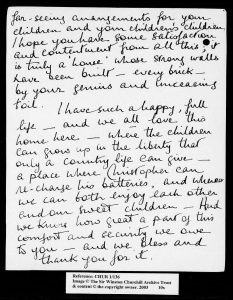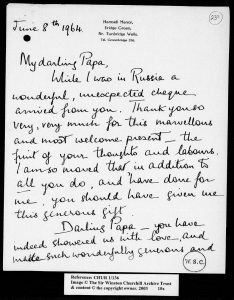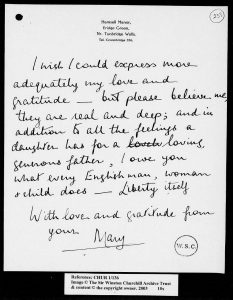
Finest Hour 176
Jack Churchill: The Faithful Brother
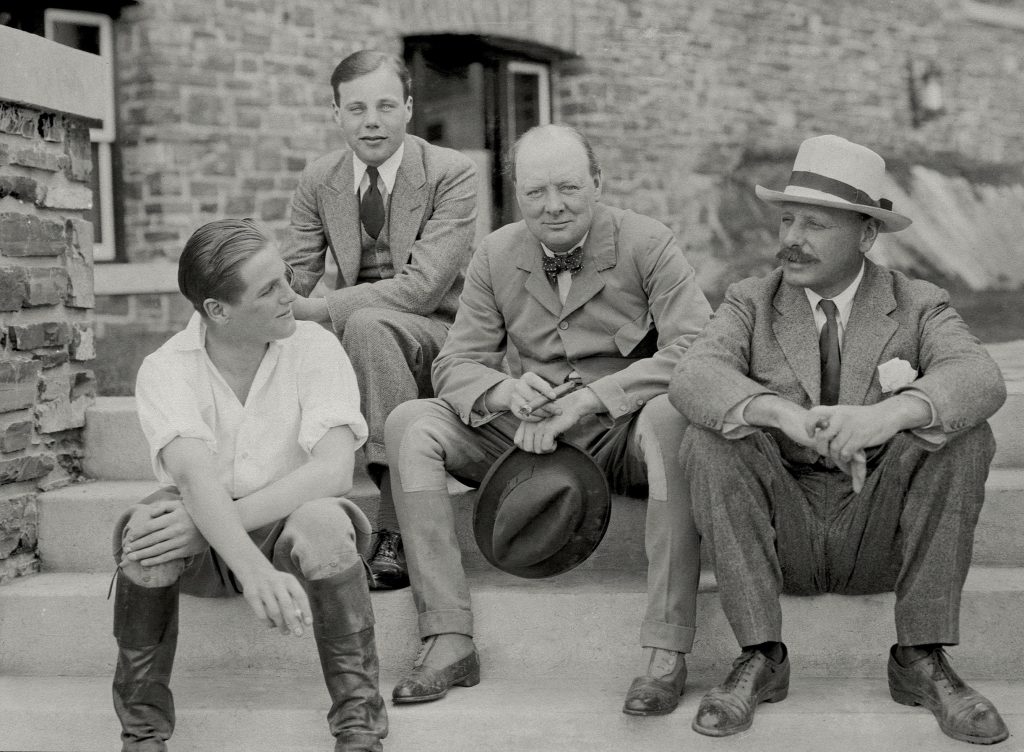
September 10, 2017
Finest Hour 176, Spring 2017
Page 20
By Celia and John Lee
In 1996 an article in the American press discussed “great leadership,” based on a work of psychology by Professor Dean K. Simonton published in 1994. It surmised that “only children” made good leaders in times of crisis and deduced that Winston Churchill fitted that category perfectly. It is small wonder that for all of his lifetime Jack Churchill, Sir Winston’s only sibling, remained an enigma. He has been shrouded in a whispering campaign that he was not a Churchill at all and any one of six different men have been cited as being his “real” father. Celia Lee’s six years’ research in the Churchills’ papers shows these allegations to be simply untrue.
John Strange Spencer Churchill (Jack) was born in Dublin on 4 February 1880, during the time his grandfather, the seventh Duke of Marlborough, was Viceroy of Ireland, and his father, Lord Randolph Churchill, was serving as his Private Secretary. The family lived there from December 1876 until April 1880. The men variously supposed to be Jack’s father never set foot in Ireland during that time, with the exception of John Strange Jocelyn, the fifth Earl of Roden. This man has been seized upon by various authors because of the unusual use of his second name as Jack’s, and it has been claimed Lady Randolph had an affair with him. Celia contacted the present Earl of Roden and determined that Jocelyn had only arrived in what is today Northern Ireland in January 1880, having inherited the title from his nephew who died of tuberculosis in Paris. Jocelyn was a lifelong friend of the seventh duke and a respectable married man with a wife and daughter living in England. Peregrine Churchill (Jack’s younger son) explained to Celia that Jocelyn, en route to visit an estate he had inherited in County Down, stopped off with the Duke and Duchess at the Viceregal Lodge in Dublin, and Jack was born whilst he was there. He stood as godfather to the child, explaining the honorific use of his middle name, as Jack was primarily named after John Churchill, the great first Duke of Marlborough.
Model Child
Readers familiar with Winston’s implied criticism of his parents as being too distant have to come to terms with the fact that Jack lived his whole life without a word of complaint against them. With the older child often described as “a handful” or “harum scarum fellow,” the younger is consistently held up as “a model child.” Even at the age of two Jack was described as a “slightly serious child.” When one houseguest asked him if he was a good boy, Jack replied “Yes, but brother is teaching me to be naughty!” After Winston’s terrible experience at his first preparatory school, St George’s, Ascot, his parents exercised more care in their choice of school for Jack, who would benefit from a more settled start to his education.

2024 International Churchill Conference
Jack was seven years and seven months old before he went as a boarder to Elstree preparatory school, where he showed academic promise from the beginning. He was invariably at the top of his form. At age twelve Jack passed the entrance examination into Harrow, a year earlier than usual, and became quite the youngest boy at the school, breezing through an arithmetic test at very short notice, and joining Winston there. He loved his brother dearly and was delighted to share a room with him, but soon found Winston to be a noisy and disruptive companion. He was again constantly top of his class, and Winston would later admit that in Jack’s entire school history to the age of seventeen he set the record for having never once been given lines or physical punishment of any sort, so exemplary was his conduct. Like Winston, Jack wrote home frequently to both his parents and whilst his letters to his mother usually asked for a little money and a hamper of food, those between father and son were more to do with which horse won which race and how much were the family’s earnings from the winnings. Being the son of “the coming man” in politics, Lord Randolph Churchill, meant that both boys were looked up to at Harrow, and they made extra pocket money by cutting out their father’s signatures from his letters to them and selling them to their classmates. Jack took very early to photography as a hobby. In 1893 his father bought him a new camera and a clock as a reward for his excellent work at school.
Having shared Winston’s passion for toy soldiers for many years, and visiting him when he went to the Royal Military College, Sandhurst, it was natural that Jack would also express an interest in the Army as a career. Their father had already made both boys superb horsemen. Lord Randolph put Jack into an “army class” at school, arranged for him to meet Lord Roberts, the Commander-in-Chief of the British army, and pulled strings to see him entered as a candidate for the 60th Rifles (all this from a man who allegedly did nothing for his sons). The tragic early death of his father was to change all that. Jack’s spendthrift mother, Jennie née Jerome, always heavily in debt, insisted she could only put one son through an army career and, putting aside the fact that Jack would have found a place at Oxford University with relative ease, immediately began to lay plans for him to follow her own father’s career path as a businessman.
Into Business and into Battle
Leonard Jerome had been a highly successful speculator in New York, making, losing, and re-making a considerable personal fortune. Jennie fondly imagined that she would set Jack up in the line of stockbroker and see him “make millions” for the family. She did make the inspired choice to send him to France for a long spell to complete his education and make him fluent in French, which would be of inestimable value in his future wartime career. Using her close friendship with the Prince of Wales, the future King Edward VII, she took Jack to a weekend party at the Prince’s country home Sandringham in Norfolk, and saw him introduced to Sir Ernest Cassel, the hugely successful banker and businessman (colloquially known as “the King’s banker”). Jack was taken on as a sort of apprentice, a personal assistant to Sir Ernest, at first perhaps without pay but soon earning a place on the establishment as a clerk. He was extremely adept at shorthand and taking dictation and accompanied Cassel on extensive business trips, most notably to his many and varied interests in Egypt. He tried to interest himself in the work but it quickly became monotonous, and we can be sure that throughout his long, and ultimately successful, career as a stockbroker it was never what he really wanted to do.
To compensate for the loss of a military career, in 1898 Jennie allowed Jack to join the prestigious yeomanry cavalry regiment with strong connections to the Marlborough family, the Queen’s Own Oxfordshire Hussars. He thrived in that capacity over many years, commanding a troop and then a squadron. In December 1899, he answered an appeal from Winston for young men to come out to South Africa to serve in the South African Light Horse regiment during the Boer War. He was commissioned as a lieutenant and troop commander on 1 February 1900 and wounded in the ankle in his very first action just ten days later, becoming the first officer casualty to be treated on the hospital ship Maine, where he was greeted by his mother, who had been the driving force behind the fitting out of the ship and had travelled on it in the role of a nurse.
Returning to active duty with his regiment, he served in Natal under Sir Redvers Buller and saw months of gruelling anti-guerrilla operations, punctuated by some sharp battles in which he conducted himself with notable gallantry. He resisted the blandishments of both his brother and his mother to “chuck” the regiment and come home, even when his mother informed him of her forthcoming marriage to George Cornwallis-West. He felt honour bound to see the thing through. He left the regiment in late October 1900, when everyone thought the war was all but won, returning home with the ringing endorsement of his colonel, Julian Byng.
Family Man
Jack resumed his career as a stockbroker, becoming a partner in Nelke Phillips in 1906, and later joining the firm of Vickers da Costa. While training with the regiment, he met the daughter of the Earl and Countess of Abingdon, the adorable Gwendeline Bertie (1885– 1941), always known by her family pet name “Goonie.” He had to wait a while to marry because of tight finances. Marriage finally came on 7 August 1908, in a registry office and on the next day in St. Aloysius Catholic Church in Oxford. The couple had three children: artist John (known as “Johnny,” 1909–92); engineer Henry Winston (known as “Peregrine,” 1913–2002); and Anne Clarissa. Now ninety-six, “Clarissa” was born in 1920. She wed Sir Anthony Eden and became Countess of Avon in 1961.
Having such a famous and successful brother as Winston was, of course, to Jack’s advantage. When Winston was First Lord of the Admiralty, Jack took every opportunity to join him on the Admiralty yacht Enchantress; Winston once wrote to Clemmie that “Jack was always happy in the circle of military things.” And through the fabulous circle of friends around his hugely popular wife Goonie, Jack was intimately acquainted with many of the great politicians, writers, and artists of the day—the Asquiths, Wiliam Orpen, the Laverys, and J. M. Barrie, to name but a few.
In 1914, while he was helping his mother sort out chaotic finances during her divorce from George Cornwallis-West, Jack discovered the true terms of his late father’s will, showing that Jennie had been denying her boys considerable income bequeathed to them by Lord Randolph. This caused a great deal of upset in the family, but, as with so many other troubles in Europe in 1914, war intervened to divert attention away from the issue.
The Great War
Jack went on active service in Flanders with his regiment and served with distinction at a crucial stage in the First Battle of Ypres. Thereafter his superb command of the French language saw him appointed to British General Headquarters in France. He was able to keep Winston fully informed of the army’s progress in their constant stream of letters. In March 1915, General Sir Ian Hamilton, a friend of Winston’s, asked for Jack to serve on his staff about to embark on the ill-fated Gallipoli expedition, since Jack was one of the few staff officers with immediate practical experience of combat in the Great War. He served throughout the campaign as the Camp Commandant, General Headquarters, a vital if not glamorous posting, making sure the headquarters functioned at peak efficiency for the duration of the campaign. When Hamilton was recalled in October 1915, Jack remained in post until January 1916, when the last troops were evacuated back to Egypt. He then joined the staff of 1st Australian and New Zealand Army Corps (the famous “Anzacs”) and served with them throughout the fighting on the Western Front from 1916 to 1918. In 1917 he was able to give his brother a guided tour over some of the recent battlefields. He ended the war as Military Secretary to Fifth Army and came home with a Distinguished Service Order in particular recognition of his liaison with the French Army.
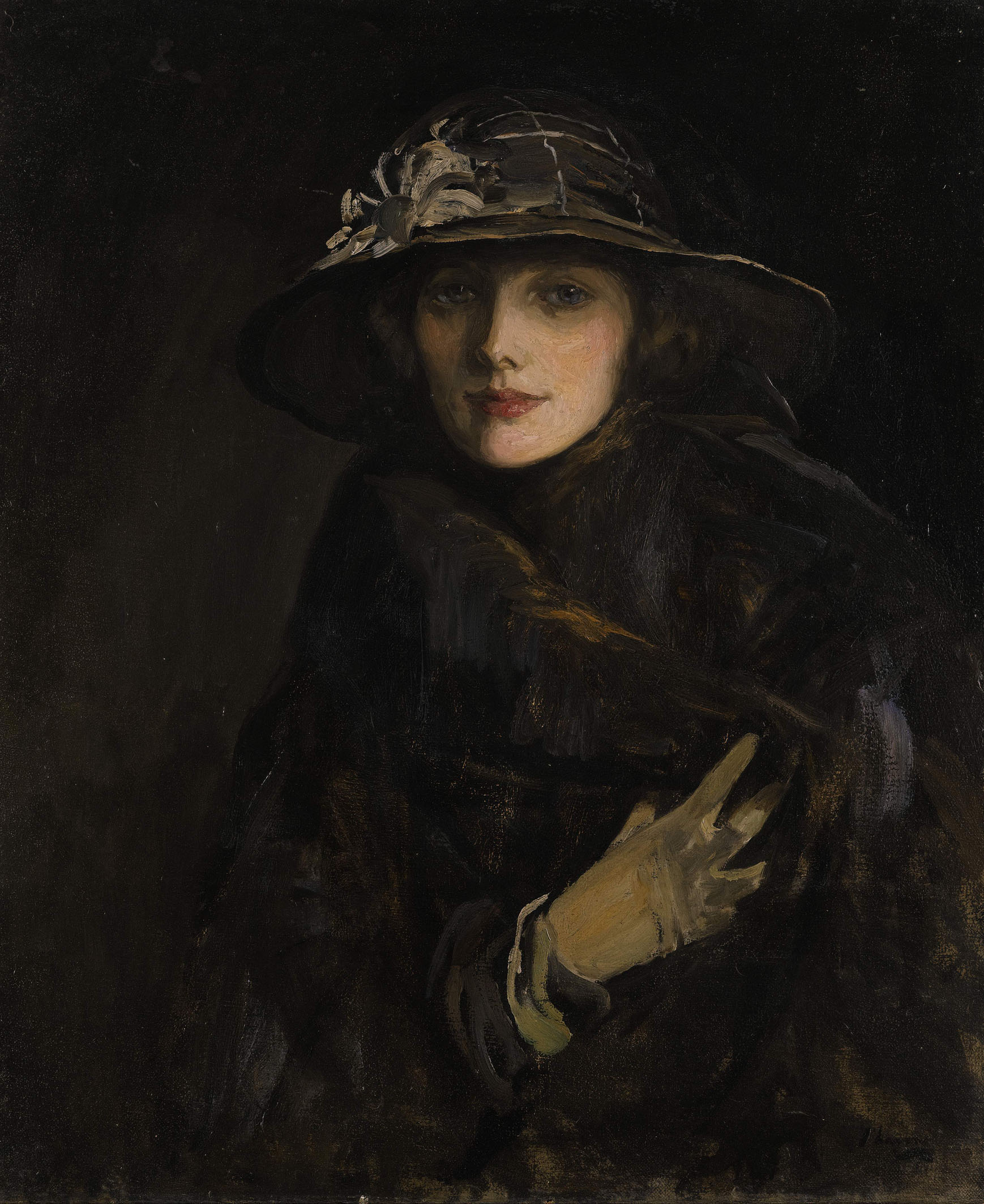
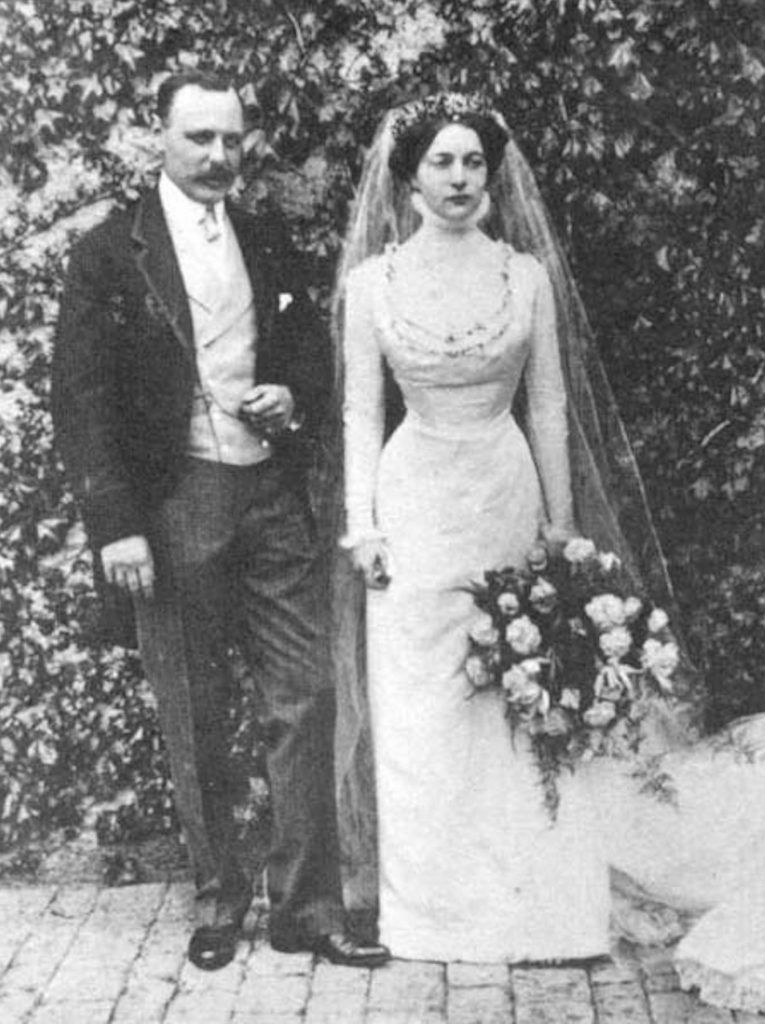
The Financier
Jack used his financial skills to assist the family in a number of ways and was especially useful to Winston during the great upheavals of the late 1920s and early 1930s. He was a well-established stockbroker now and was made a partner in Vickers da Costa in 1921. So comfortable was he that in 1929 he was able to accompany Winston and their sons Randolph and Johnny on a three-month tour of North America. The “Great Crash” occurred while they were there, and Jack was busy thereafter supervising the “retrenchments” necessary in Winston’s normally extravagant life. He deftly managed their tax affairs and was able to direct the family’s investments into some very far-sighted and successful areas, including copper and gold mining, Marks and Spencer, and Gaumont British Films.
At the outbreak of the Second World War in 1939, Jack was of course too old for active service but was a constant companion and support to his brother, who was soon achieving his crowning glory as Prime Minister, 1940–1945. Though himself diagnosed with a heart tumour, and nursing a terminally ill Goonie, Jack made time to organise a staff canteen at Downing Street that greatly improved the productivity of Winston’s immediate staff there. Goonie, an inveterate heavy smoker, died on 7 July 1941. Jack suffered a heart attack in April 1945 and after the hard winter of 1946–47 succumbed to heart failure on 22 February 1947 with Winston and Johnny at his side. Because of the bad weather of that terrible winter, Winston’s doctors advised against him attending the funeral as Jack was laid to rest in the family plot at St Martin’s Church, Bladon, Oxfordshire.
Winston’s doctor, Lord Moran, once marvelled at how Jack got on with life “as if he had not a care in the world.” He was the quiet, unassuming, younger brother, a great family man to his own, and a stalwart supporter of his brother in all his greatest endeavours.
Celia and John Lee are authors of The Churchills: A Family Portrait (2010) and Winston and Jack: The Churchill Brothers (2007), from which all quotations in this article are drawn.
Subscribe
WANT MORE?
Get the Churchill Bulletin delivered to your inbox once a month.
